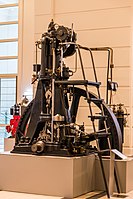
Photo from wikipedia
Abstract The current study aims to evaluate the performance and emission characteristics of a modified common rail direct injection (CRDI) diesel engine fueled by Ricinus communis biodiesel (RCME20), diesel (80%),… Click to show full abstract
Abstract The current study aims to evaluate the performance and emission characteristics of a modified common rail direct injection (CRDI) diesel engine fueled by Ricinus communis biodiesel (RCME20), diesel (80%), and their blends with strontium-zinc oxide (Sr@ZnO) nanoparticle additives. The Sr@ZnO nanoparticles were synthesized using aqueous precipitation of zinc acetate dehydrate and strontium nitrate. Several characterization tests were performed to study the morphology and content of synthesized Sr@ZnO nanoparticles. The Sr@ZnO nanoparticles were steadily blended with RCME20-diesel fuel blend in mass fractions of 30, 60 and 90 ppm using a magnetic stirrer and ultrasonication process. For the long term stability of nanoparticles, Cetyl trimethylammonium bromide (CTAB) surfactant was added. The physicochemical properties of the fuel blends were measured using ASTM standards. The CRDI engine was operated at two compression ratios 17.5 and 19.5, 1000 bar injection pressure, 23.5°BTDC injection timing and constant speed. For enhanced swirl and turbulence, and improved spray quality lateral swirl combustion chamber and 6-hole fuel injector were used. The compression ratio of 19.5 and 60 ppm of Sr@ZnO enhanced the overall engine characteristics compared to RCME20 fuel. The engine characteristics such as BTE, HRR, cylinder pressure increased by 20.83%, 24.35%, 9.55% and BSFC, ID, CD, smoke, CO, HC and CO2 reduced by 20.07%, 20.64%, 14.5%, 27.90%, 47.63%, 26.81%, 34.9%, while NOx slightly increased for all nanofuel blends.
Journal Title: Energy
Year Published: 2021
Link to full text (if available)
Share on Social Media: Sign Up to like & get
recommendations!